Greetings! The Ancestral Homekeeper is a weekly newsletter dedicated to asking questions about what it means to live slowly and simply in our modern era. I’m Kristina, and I believe that the way we shape our lives at home will be reflected in our society at large. By blending the wisdom of our ancestors with contemporary thoughts on mental health, self nurturing, and social justice, we can find the path to the changing our world. New letter is out every Sunday!
I’ve been keeping my eye on the plum tree for a few weeks now, knowing I would get a chance to gather up enough of my own fruits to make a plum cake. To my delight, the weedy circle around the base of the tree is littered with freshly fallen, perfectly ripe plums. Harvest has begun! But I have forgotten to bring a basket or a bowl for them, and I am in my pajamas. Too excited to make a trip back to the house, I bend over and begin stuffing them in my pockets. My pants bulge and will soon be stained.
I planted this tree on pure instinct — we were at the nursery and I had peaches on my mind. I wanted the Claret Blood Clingstones, with their tart red flesh that just screams decadence and sensuality. But then, at the end of the row, I saw a lone Italian Prune Plum. And suddenly a lifetime of plum memories flashed through my mind, like shuffling tarot cards arcing in the air. Seeing these plums at the farmer’s market as a child, the same market my children visit with me on Sundays. Baked in a cake while visiting in Germany, fresh from the oven by my Tante Evie.
I haven’t seen Tante Evie, or any of my maternal German relatives, in about twenty years. Every year there is an excuse — the flights to Germany are too expensive, I can’t get the time off work, we’re saving for a wedding, the baby is too little — and the list gets more creative every year. I wear a little silver ring they gave me, on my right hand. It is an unbreakable bond to the family that still lives, and the ancestors that we have all come from.
Back in California, I empty my pockets of plums on to the kitchen counter. Driven again by instinct, I turn around and pull open my baking drawer, which has too many ingredients stuffed in it to close properly. In recent years, it has become a mission to recreate the memories of my youth, the ambrosial scent of these baked plums wafting out of the oven, nestled into their sweet cake pillow.
But I didn’t have a recipe. My mother, still alive and living a three hours drive up into the mountains, could probably give me hers if I asked. That won’t happen. That can’t happen. I haven’t heard her voice in almost four years. It took me a lifetime to make that decision, after trying nearly every single thing I could think to do to heal the wounds of my childhood. It took over a decade of therapy before I finally realized what so many adult children of alcoholics must realize — you cannot change a person, you can only change yourself. I had to learn to hold a boundary, to respect myself enough to do what I needed to do for my own mental health and to protect my own family. I asked my mother to go to therapy with me if she wanted to continue a relationship, and she refused. So I told her I loved her, and I told her goodbye.
It seemed impossibly ironic to me that I could devote so much of my time looking at my genealogy, my ancestral lineages, and thinking about the ancient wisdom we have all inherited while simultaneously being divorced from my maternal family of origin. No one told me when my grandmother fell ill, or called me to say her time was coming close. I only learned of her passing after my stepbrother gave me a call the day after. This is the price that I have paid for protecting myself.
But I am safe. My inner little girl is healing every day, which is profoundly connected to the act of mothering my own children. I may be an unmothered mother, but I am also in a place where I am learning to mother myself.
The plums are calling to me. There’s no one I can ask for the recipe, and the interwebs are just not unearthing anything that sounds quite right. I turn to my recipe books, the shelf where I keep all the German ones. I thumb through the old ones, the Mimi Sheraton one, the old Dr. Oetker book that previously belonged to my spouse’s grandmother. I’ve tried some of these pflaumenkuchen recipes, and none of them have yet hit that deep memory itch.
As is inevitable, I reach for Classic German Baking, by Luisa Weiss. Ever since it came out a few years back, it has been such a trusty source for the recipes I never got a chance to get from my mother and grandmother. She’s been my guide.
And this is what I do, to maintain my links to my heritage. I search for guides. I use ancestry.com to learn about the lineages I carry in my blood and bones. I research the strains out of the Alps, from the moors of Scotland and the peaty bogs of Ireland. I devour stories from Norway. I trace the lives of my Ashkenazi Jewish forbears and write their names down in my journal.
Sometimes, when I’ve finally put the children to sleep and my spouse is snoring softly beside me, I imagine my ancestors are there with us. I picture grandmothers and great-grandmothers stretching back through the centuries, in concentric circles surrounding me, radiating like skipping stones on a still pond. I imagine them smiling, laughing, beaming with love. Sometimes one of them steps forward and embraces me, or gives me a message of love and kindness that I am so obviously longing to hear. Mostly they just bear witness. Occasionally I will pull some cards to ask for specific guidance, but often I just let their love wash over me before I drift off into sleep.
It’s a funny thing, this instinctive method of connecting to ancestry while bypassing living relatives. I would be wrestling with imposter syndrome, if it weren’t for the intense waves of love and care that rise up when I feel the presence of my ancestors. I know they are rooting for me, and they are here to help me break the chains of alcoholism, neglect, abuse, and abandonment. It’s a deep knowing in my bones — they are here, and they are here for me. If I were a traditionally religious person, I might call it faith, but I am not. I just accept that this is what is true for me and allow myself to be carried by their presence.
Do they miss the scent of plums and streusel baking in the oven? Can they feel through me, like osmosis? Can they experience the deep pleasure of the lemon-yeasty-cinnamon-plummy-butter fragrance of pflaumenkuchen? If they cannot, I know they radiate joy at sensing me in this state of primal joy. It is pure. It is a link that binds us. It is a thread that wraps around my body, my children’s bodies, and ties us to the grandmothers that have gone before. It is unbreakable.
Luisa’s recipe is perfect as usual. It’s easy enough, and it makes my children giggle as they wait impatiently for it to cool. My first plum cake using plums from a tree I grew, on land that is ours. So much healing right there in that sentence!
And of course, it is not the cake of my memory. There’s a brief twinge of sadness, the same sadness when I realize I will never hold an infant that is mine again, will never get a chance to make amends for that past friendship that broke. Some memories are destined to stay locked in the past, and no matter how many recipes I try. I don’t think it would matter if I found “the right one,” because my memory is an amalgamation of cakes. A blending of memories that I’m not entirely sure are even all mine. I am a vessel. The living nexus where ancestor and descendant meet.
It’s a cake, and it is everything. It is a symbol of all the connection points to my heritage, my ancestors, my devotion to the children that came out of my body to find their own joy in this marvelous world of ours. I whip the schlagsahne to serve alongside, and we eat piece after piece until our mouths are sticky and our bellies are full. We laugh and cuddle, and I know. This is why I am alive. To make plum cake with my children and heal some of the wounding in our ancestral line. It is enough, and it is perfect.




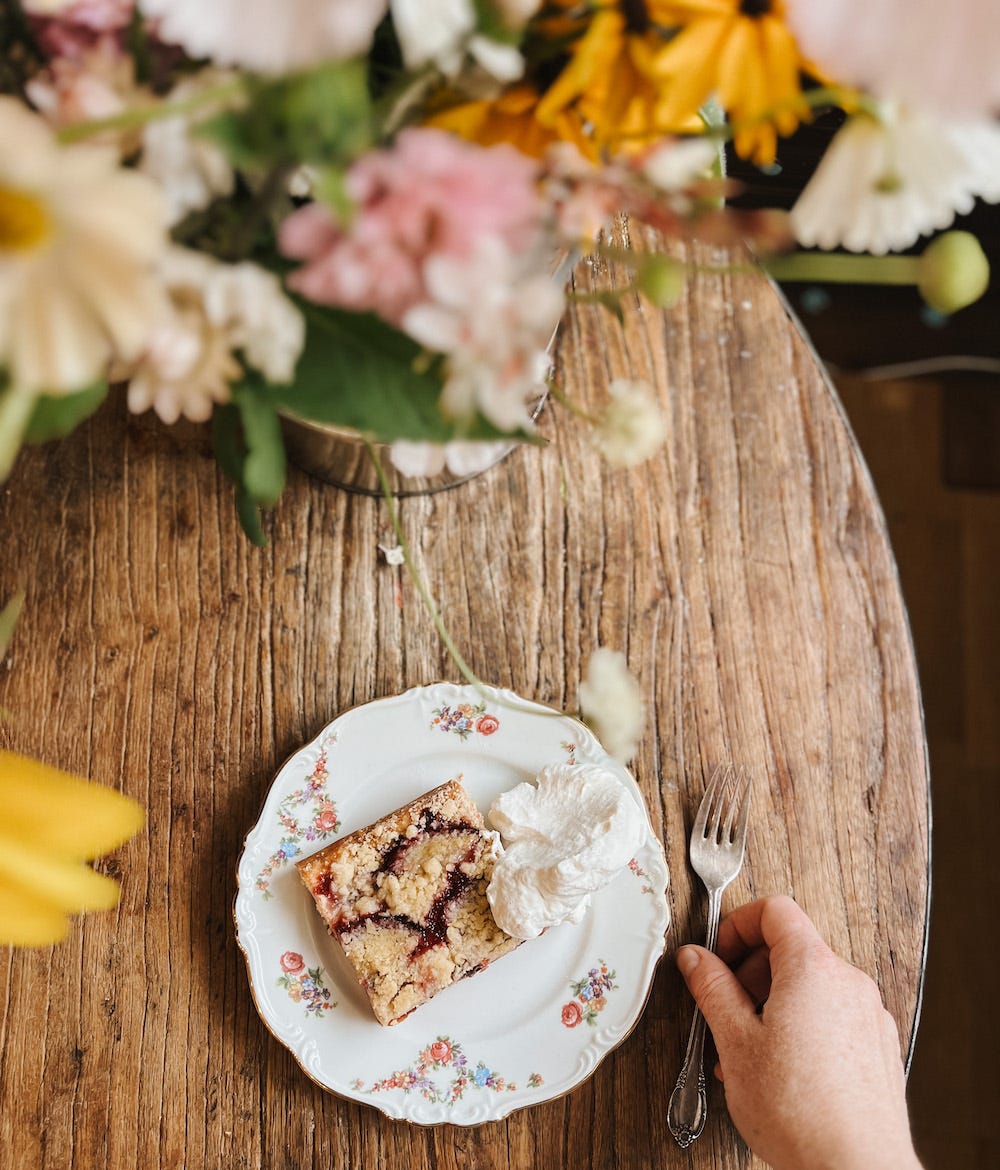
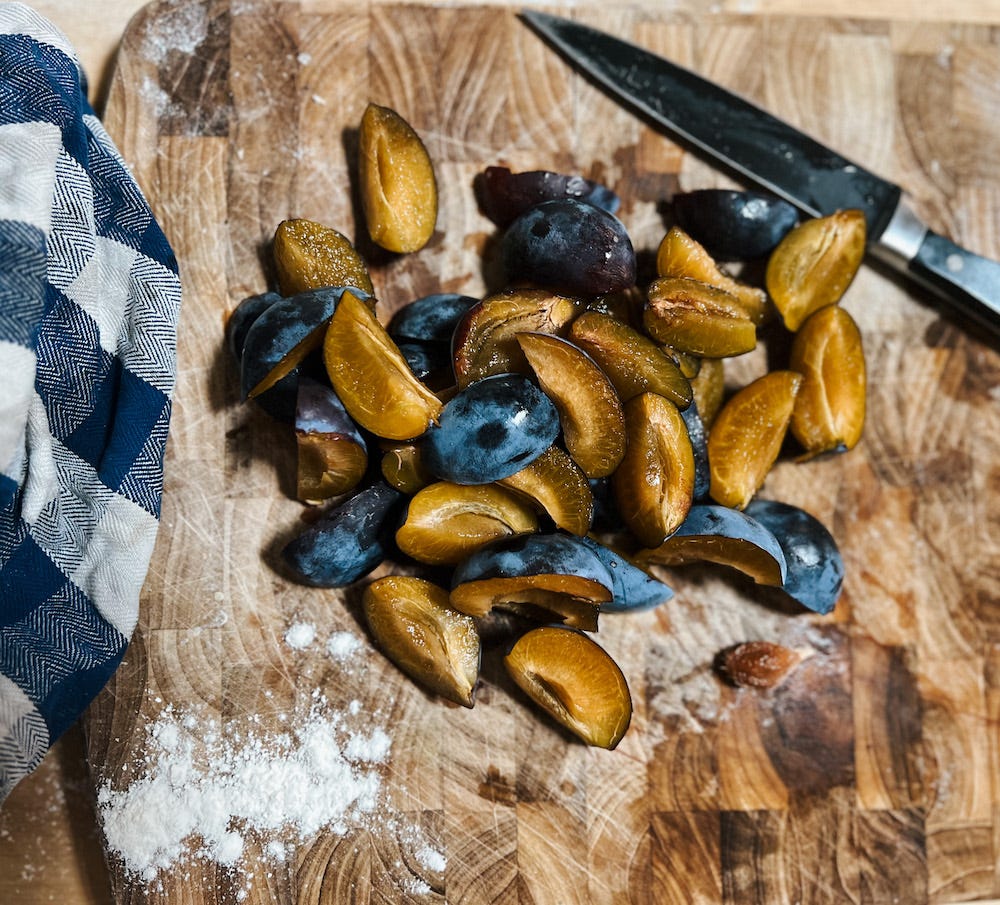
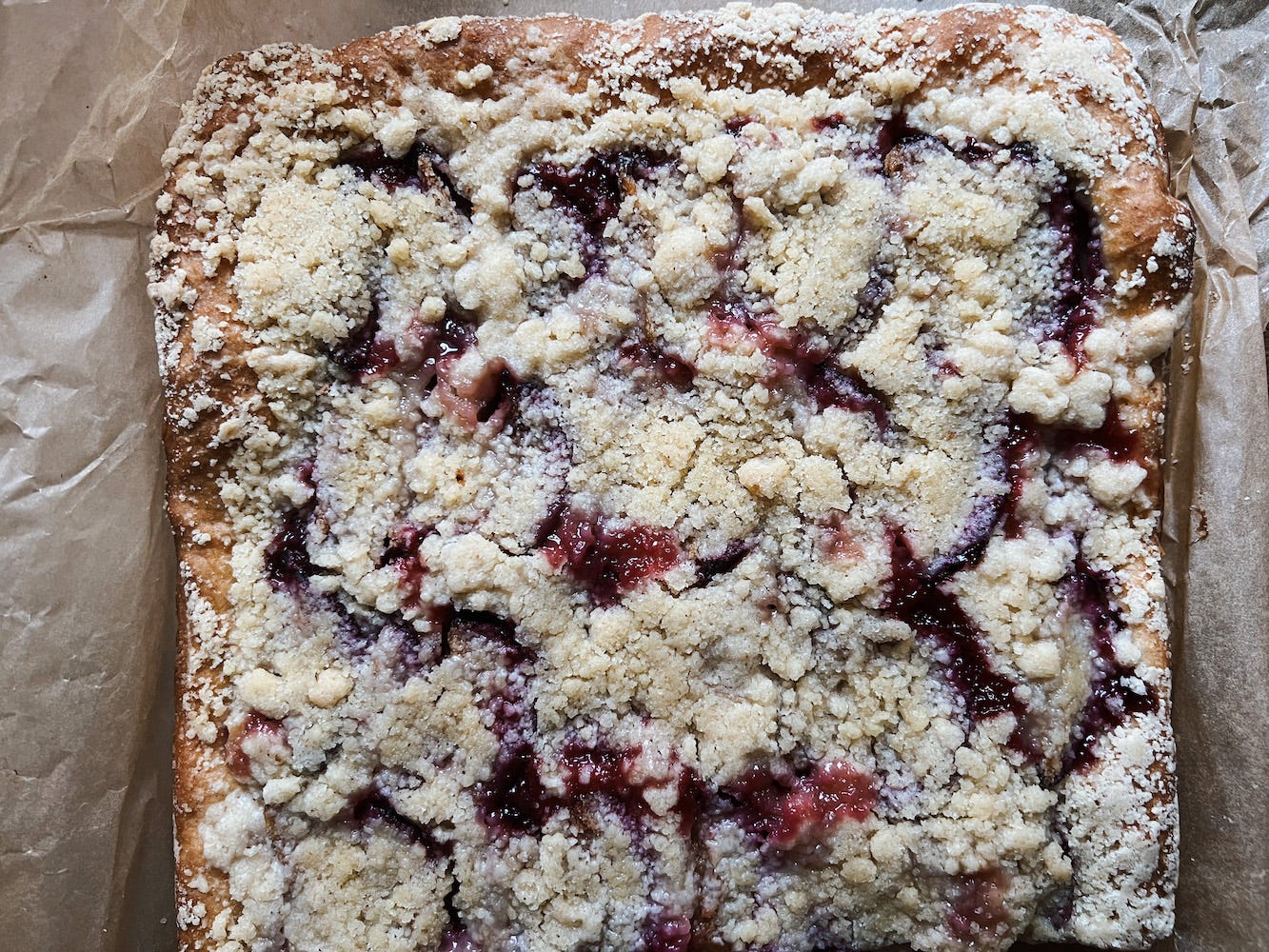
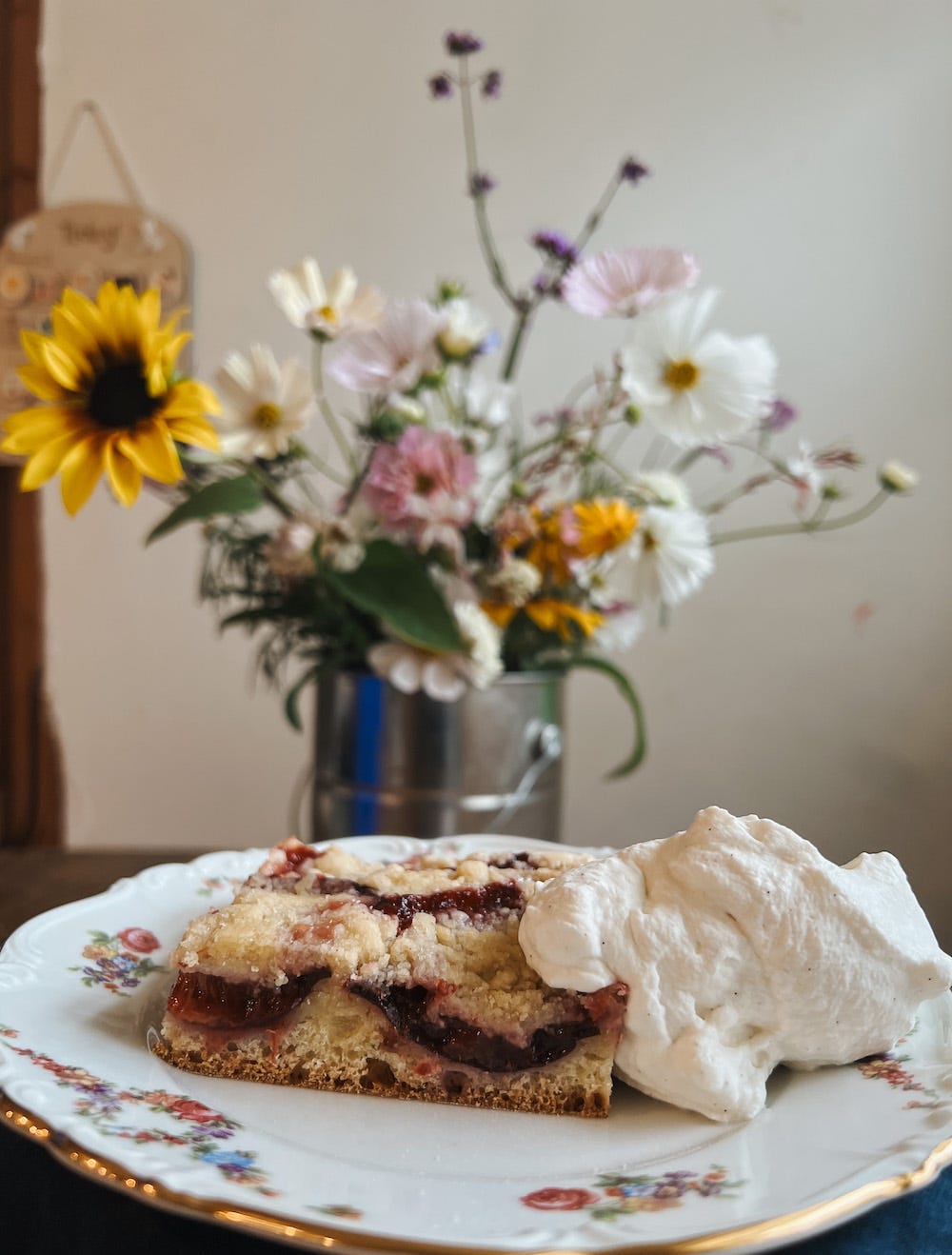
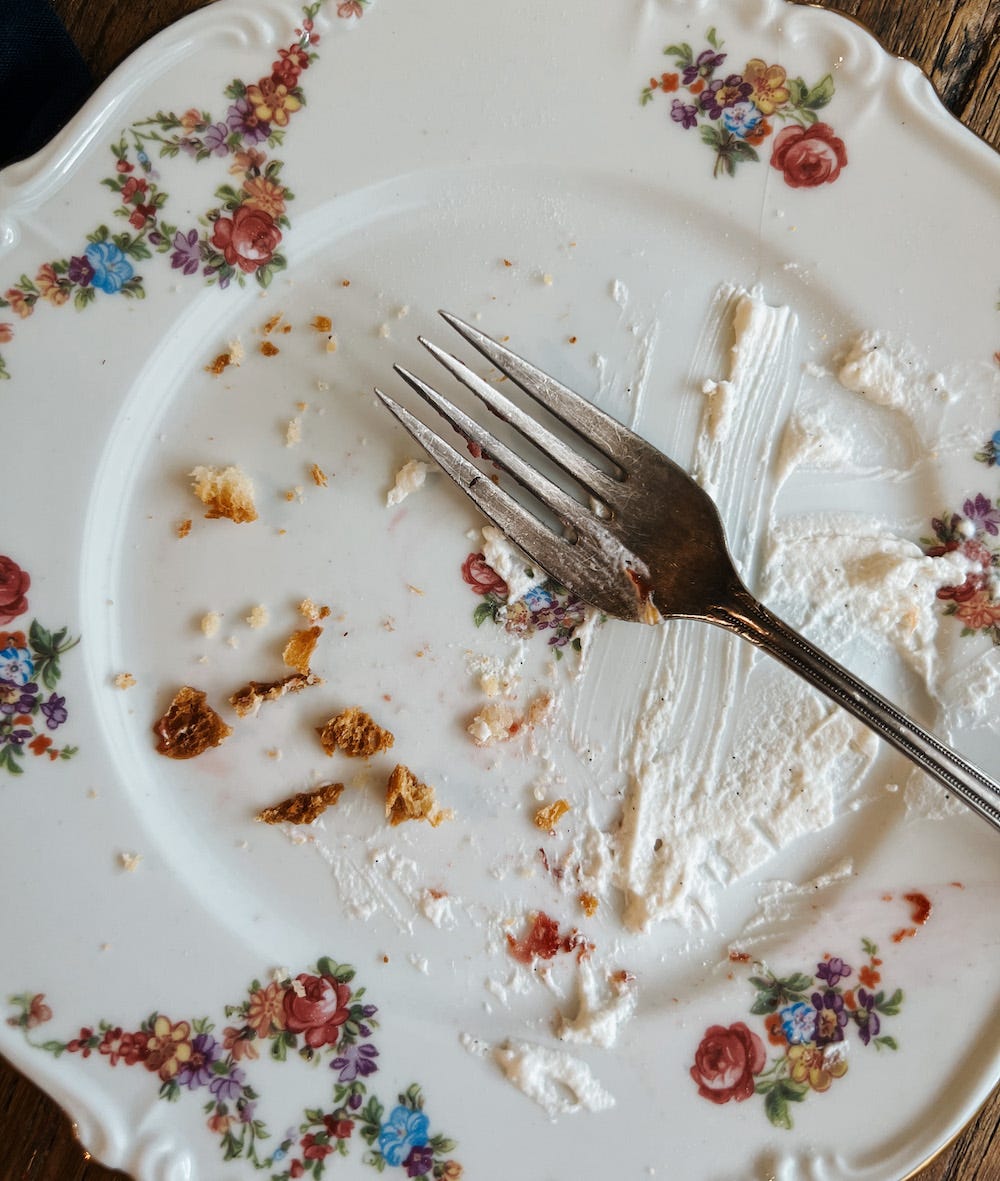
Thank you for writing such an important post. Food is such a fundamental need, and so many memories are bound up in food. Your “mission to recreate the memories of my youth”, and your eloquence in describing the plums is beautiful. You remind us that cooking can be a link back to our ancestors - and it is a gift you will give your children, and their children.
I am sad that you are not able to be in touch with your mother; not all memories are happy. I am also an unmothered mother - so much so that the adoption authorities were concerned that I would not manage to be a good mother. My daughter is 18, and we survived the storms, and my husband’s death, and have done a good job together.
Wow, this article stopped me in my tracks. Beautifully written, thank you so much for sharing. I love the idea of feeling your ancestors around you, I will definitely be taking that practice forward from now on ❤️